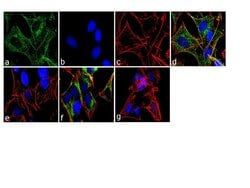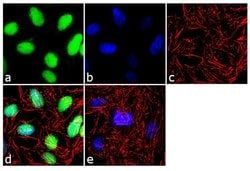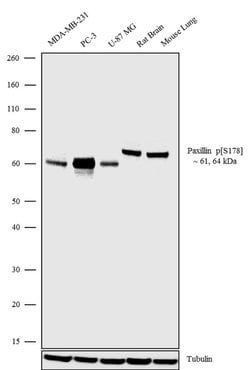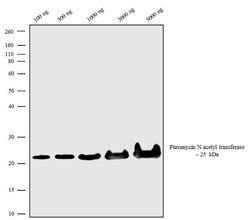Phospho-CaMKII (Thr305,Thr306) Recombinant Polyclonal Antibody, Invitrogen™
Manufacturer: Thermo Scientific
Select a Size
| Pack Size | SKU | Availability | Price |
|---|---|---|---|
| Each of 1 | PI711389-Each-of-1 | In Stock | ₹ 44,544.50 |
PI711389 - Each of 1
In Stock
Quantity
1
Base Price: ₹ 44,544.50
GST (18%): ₹ 8,018.01
Total Price: ₹ 52,562.51
Antigen
Phospho-CaMKII (Thr305,Thr306)
Classification
Recombinant Polyclonal
Conjugate
Unconjugated
Gene
CAMK2A
Gene Alias
alpha CaM kinase II; alpha-CaMKII; Ca2+/calmodulin-dependent protein kinase II; Ca2+/calmodulin-dependent protein kinase II alpha; Calci; calcium/calmodulin dependent protein kinase II alpha; calcium/calmodulin-dependent protein kinase (CaM kinase) II alpha; calcium/calmodulin-dependent protein kinase II alpha; calcium/calmodulin-dependent protein kinase II alpha subunit; calcium/calmodulin-dependent protein kinase II alpha-B subunit; calcium/calmodulin-dependent protein kinase type II alpha chain; calcium/calmodulin-dependent protein kinase type II subunit alpha; CaM kinase II alpha subunit; caM kinase II subunit alpha; CaMK II; CAMK2; Camk2a; CAMKA; CaMKII; CaMK-II alpha subunit; caMK-II subunit alpha; CaMKIINalpha; CaM-kinase II alpha chain; EC 2.7.11.17; KIAA0968; mKIAA0968; OTTHUMP00000165787; OTTHUMP00000165788; Phospho-CaMKI; PK2CDD; PKCCD; R74975
Host Species
Rabbit
Purification Method
Protein A
Regulatory Status
RUO
Gene ID (Entrez)
815
Content And Storage
Store at 4°C short term. For long term storage, store at -20°C, avoiding freeze/thaw cycles.
Form
Liquid
Applications
Immunocytochemistry
Concentration
0.5 mg/mL
Formulation
PBS with 0.09% sodium azide; pH 7.2
Gene Accession No.
Q9UQM7
Gene Symbols
CAMK2A
Immunogen
Peptide corresponding to Human CAMK2G (aa 300-309)
Quantity
100 μg
Primary or Secondary
Primary
Target Species
Human
Product Type
Antibody
Isotype
IgG
Description
- This antibody is predicted to react with Monkey, Horse and Bat Recombinant rabbit polyclonal antibodies are unique offerings from Thermo Fisher Scientific
- They are comprised of a selection of multiple different recombinant monoclonal antibodies, providing the best of both worlds - the sensitivity of polyclonal antibodies with the specificity of monoclonal antibodies - all delivered with the consistency only found in a recombinant antibody
- While functionally the same as a polyclonal antibody - recognizing multiple epitope sites on the target and producing higher detection sensitivity for low abundance targets - a recombinant rabbit polyclonal antibody has a known mixture of light and heavy chains
- The exact population can be produced in every lot, circumventing the biological variability typically associated with polyclonal antibody production
- CAMK2A (CaMKII alpha) is a serine/threonine kinase that regulates a number of cellular functions including neuronal processes, gene expression, carbohydrate metabolism, cytoskeletal function, and calcium homeostatsis
- Autophosphorylation of threonine 286 in the presence of Ca2+ and calmodulin activates CAMK2A with the ability to switch from calmodulin-dependent to a calmodulin independent activity
- CaMKII is an ubiquitously expressed serine/threonine protein kinase that is activated by Ca2+/calmodulin (CaM) binding and autophosphorylation and has been implicated in regulation of the cell cycle and transcription
- It is involved in dendritic spine and synapse formation, neuronal plasticity and regulation of sarcoplasmic reticulum Ca2+ transport in skeletal muscle
- In neurons, plays an essential structural role in the reorganization of the actin cytoskeleton during plasticity by binding and bundling actin filaments in a kinase-independent manner.



